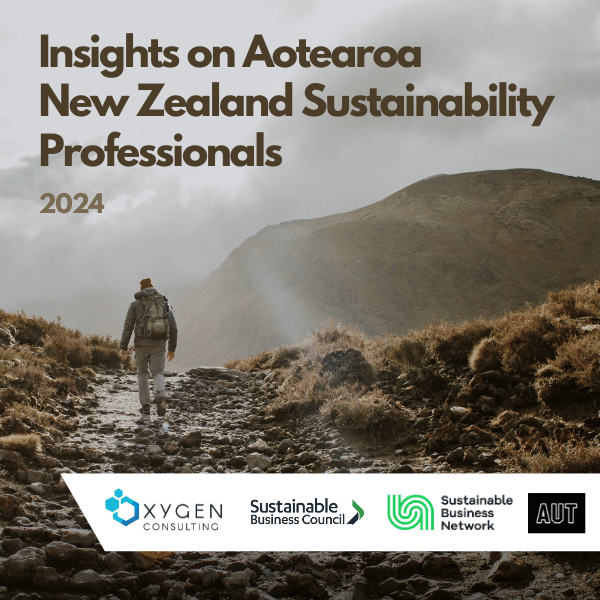Oxygen Consulting, in partnership with Auckland University of Technology (AUT), the Sustainable Business Council (SBC), and the Sustainable Business Network (SBN), have launched their fifth annual survey on the sustainability profession in Aotearoa New Zealand and are inviting eligible participants to take part.
This year’s research builds on the 2023 study, which unlocked insights on three different role types within the sustainability profession for the first time. We will take this further in 2024 to investigate the capability development necessary to support the different roles.
The 2024 research will continue to explore the remuneration, gender pay equity, competencies, support requirements, succession pathways and wellbeing of sustainability professionals across each of the role types.
”Five years into this research we are beginning to build some great longitudinal data on the sustainability profession, alongside a more nuanced picture of the different role types”, says Sarah Holden, Director of Oxygen Consulting. “This is critical information for companies looking to recruit or support sustainability roles – something which is on the rise as organisations race to meet their regulatory or competitive requirements for sustainability. Equally, we know that sustainability as a professional career option is of increasing interest, so we want to dig into the capability requirements more this year, to provide more insight on the potential pathways into different roles and give organisations a better picture of the professional development their sustainability staff may require to support them in their roles. Last year we identified that there may be a capability gap in the sustainability profession – we want to tackle that this year as our research continues to serve its purpose to help grow the sustainability profession.”
“The world continues to change around us,” Founder and CEO of the Sustainable Business Network Rachel Brown says. “Global expectations are rising and sustainability roles are becoming formalised across all sectors and company sizes. We’re pleased to be partnering again with Oxygen Consulting, SBC and AUT to gain a better understanding of the profession and help others understand what is happening too. Pressure from investors and customers – particularly global ones – is increasing. Businesses need to build their capability to avoid getting into trouble or missing out on opportunities. Getting things like sustainability reporting, data gathering and investment right is really important. The insights from this research are useful for those wanting to work in this space as much as for businesses who are active in it.”
“We are very pleased to once again be partnering with Oxygen Consulting, SBN and AUT on this increasingly important research, which offers critical insights into the ever-evolving sustainability sector in Aotearoa New Zealand,” says Sustainable Business Council Executive Director Mike Burrell. “More and more, organisations are recognising the scale and immediacy of the sustainability challenges we’re facing – and importantly, that tackling those challenges will not only require capital, but also access to essential sustainability skills and capabilities. This research is a crucial way for business to keep a finger on the pulse of the sustainability sector and understand what might be needed to ensure it can grow at the pace required.”
In the fifth year of this research, Dr. Marjolein Lips-Wiersma, Professor of Ethics and Sustainability at Auckland University of Technology reflects on the maturing and significance of the research. “In yielding long-term data, this research is making an important practical and theoretical contribution.” Each year we continue to observe new trends amongst sustainability professionals in Aotearoa New Zealand and the shifting landscape in which they operate in.
This research is open from 7 February – 7 March 2024 to people currently working in an Aotearoa New Zealand organisation and have sustainability as part or all of their role. This includes professionals with some sustainability responsibilities as well as those in dedicated sustainability roles. ‘Sustainability’ includes responsibilities to address social, environmental, and economic risks to the organisation and participants can be in full-time, part-time, or contractual positions within public, private, not-for-profit and charity sectors.
AUT’s Ethics Committee (AUTEC) has approved this research (AUTEC reference number 23/1) and a participant information form outlining the research in detail can be found here.
To go straight to the survey, click here.

